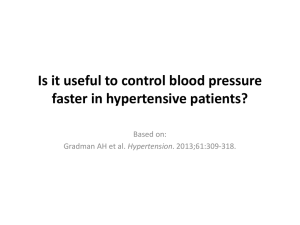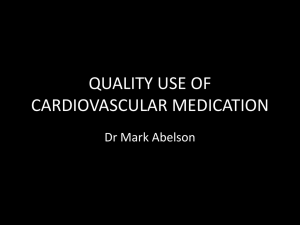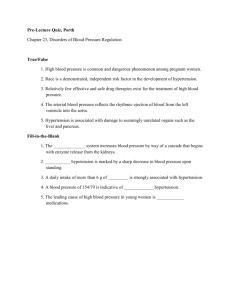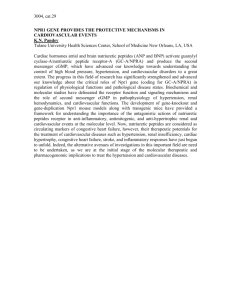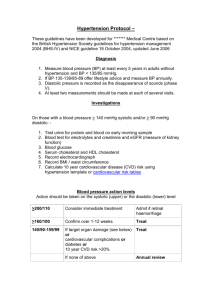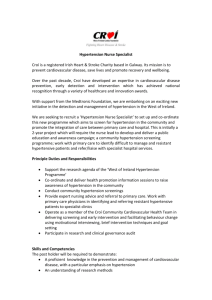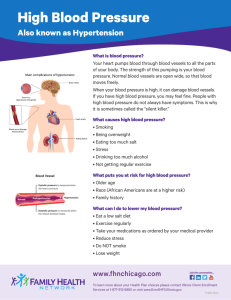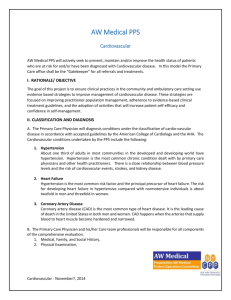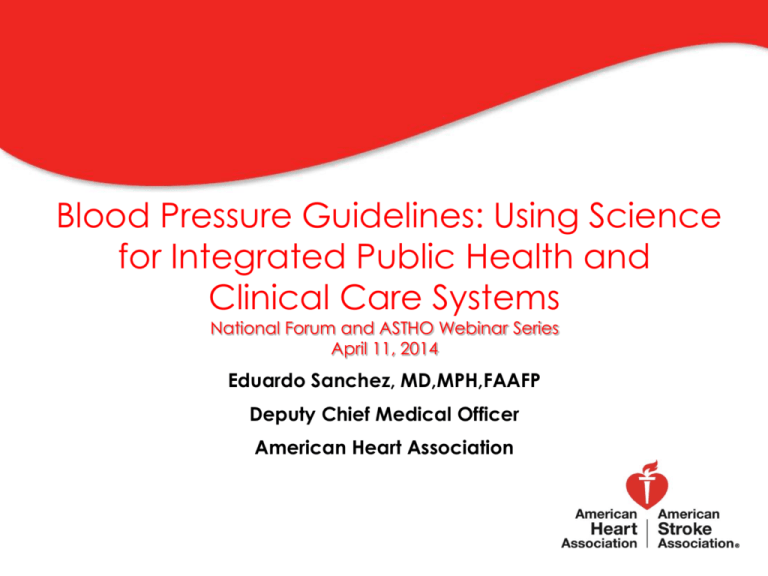
Blood Pressure Guidelines: Using Science
for Integrated Public Health and
Clinical Care Systems
National Forum and ASTHO Webinar Series
April 11, 2014
Eduardo Sanchez, MD,MPH,FAAFP
Deputy Chief Medical Officer
American Heart Association
2010 Leading Causes of Death
in the United States
1.
2.
3.
4.
5.
6.
7.
8.
Heart disease
Cancer
Lower respiratory diseases
Stroke and related diseases
Accidents
Alzheimer’s disease
Diabetes
Kidney diseases
CDC
9. Influenza, pneumonia
10. Suicide
11. Septicemia
12. Chronic liver disease and
cirrhosis
13. Hypertension and related
renal disease
14. Parkinson’s disease
15. Pneumonitis
Shorter Lives, Poorer Health
• Heart disease: The US death rate from ischemic heart disease is
the second highest among peer countries. Americans reach age
50 with a less favorable cardiovascular risk profile than their peers
in Europe, and adults over age 50 are more likely to develop and
die from cardiovascular disease than are older adults in other
high-income countries.
• Obesity and diabetes: The US has the highest obesity rate among
high-income countries. U.S. adults have among the highest
prevalence rates of diabetes (and high plasma glucose levels)
among peer countries.
NRC and IOM, January, 2013
Top 10 risk factors for health loss in 2010 and the number of deaths
attributable to each
1.
2.
3.
4.
5.
6.
7.
8.
9.
10.
Dietary risks
Smoking
High blood pressure
High body mass index
Physical inactivity
High blood sugar
High total cholesterol
Ambient air pollution
Alcohol use
Drug use
Institute for Health Metrics and Evaluation (IHME),2013
678,282
465,651
442,656
363,991
234,022
213,669
158,431
103,027
88,587
25,430
Age-adjusted prevalence trends for high blood pressure in adults ≥20 years of age by race/ethnicity,
sex, and survey (National Health and Nutrition Examination Survey: 1988–1994, 1999–2004, and
2005–2010).
Go A S et al. Circulation. 2014;129:e28-e292
Copyright © American Heart Association, Inc. All rights reserved.
Extent of awareness, treatment, and control of high blood pressure by race/ethnicity (National Health
and Nutrition Examination Survey: 2007–2010).
Go A S et al. Circulation. 2014;129:e28-e292
Copyright © American Heart Association, Inc. All rights reserved.
US Census data (2012)
Whites
78.1%
Non Hispanic Whites
63.4%
Blacks
13.1%
American Indian/Alaska Natives
1.2%
Asians
5.0%
Hawaiian/Pacific Islanders
0.2%
Hispanic or Latino Origin
16.7%
Projected Population
2000
2010
2020
2030
2040
2050
Total Pop 282 M
309 M
336 M
364 M
392 M
420 M
White
69.4%
65.1%
61.3%
57.5%
53.7%
50.1%
Hispanic
12.6%
15.5%
17.8%
20.1%
22.3%
24.4%
Black
12.7%
13.1%
13.5%
13.9%
14.3%
14.6%
Asian
3.8%
4.6%
5.4%
6.2%
7.1%
8.0%
census.gov
Healthy Aging is Dependent on a Lifetime
of Healthy Living
– Ideal cardiovascular health (defined as the absence of established risk
factors at 50) is associated with very low lifetime risk for CVD and markedly
longer survival
– These results should promote efforts aimed at preventing development of
risk factors in young individuals
– The higher lifetime risks of CVD and lower survival in those with
intermediate or high risk factor burden at 50 years of age should be used
to in communicate risks and support intensive preventive therapy
Prediction of Lifetime Risk for Cardiovascular Disease
by Risk Factor Burden at 50 Years of Age,
Lloyd-Jones, et al, Circulation 2006;113;791-798
AHA 2020 Strategic Impact Goals
By 2020, to improve the cardiovascular health of all
Americans by 20%, while reducing deaths from
cardiovascular disease and stroke by 20%.
HEALTH BEHAVIORS
HEALTH FACTORS
Smoking
Diet
Physical Activity
Body Weight
• Glucose
• Cholesterol
• Blood Pressure
•
•
•
•
Ideal
Cardiovascular
Health -AHA
Cardiovascular
Health Definitions
LIFE’S SIMPLE 7
Smoking Status
Adults >20 years of age
Children (12–19)
Physical Activity
Adults > 20 years of age
Children 12-19 years of age
Healthy Diet
Adults >20 years of age
Children 5-19 years of age
Healthy Weight
Adults > 20 years of age
Children 2-19 years of age
Blood Glucose
Adults >20 years of age
Children 12-19 years of age
Cholesterol
Adults >20 years of age
Children 6-19 years of age
Blood Pressure
Adults >20 years of age
Children 8-19 years of age
POOR
INTERMEDIATE
IDEAL
Current Smoker
Tried prior 30 days
Former ≤ 12 mos
Never /quit ≥ 12 mos
1-149 min/wk mod or
1-74 min/wk vig
or 1-149 min/wk mod + vig
150+ min/wk mod or 75+
min/wk vig or 150+ min/wk mod
+ vig
>0 and <60 min of mod or vig every
day
60+ min of mod or vig every day
0-1 components
0-1 components
2-3 components
2-3 components
4-5 components
4-5 components
≥30 kg/m2
>95th percentile
25-29.9 kg/m2
85th-95th percentile
<25 kg/m2
<85th percentile
126 mg/dL or more
126 mg/dL or more
100-125 mg/dL or treated to goal
100-125 mg/dL
Less than 100 mg/dL
Less than 100 mg/dL
≥240 mg/dL
≥200 mg/dL
200-239 mg/dL or treated to goal
170-199 mg/dL
<170 mg/dL
SBP ≥140 or DBP ≥90 mm Hg
SBP120-139 or DBP 80-89 mm Hg or
treated to goal
None
None
>95th percentile
90th-95th percentile or SBP ≥120 or
DBP ≥80 mm Hg
<120/<80 mm Hg
<90th percentile
Simple 7 ™ Heart Health Factors
that Reduce Mortality
•
•
•
•
•
•
•
No Tobacco use
Physical activity
Healthy eating
Healthy Weight
Normal Blood pressure
Normal Cholesterol
Normal Hemoglobin A1c
(normal blood glucose
levels)
Yang, et al, JAMA, Vol 307, No.12, March 28, 2012
Deaths per 1000 person years
Age-standardized prevalence estimates of US adults aged ≥20 years meeting different numbers of
criteria for ideal cardiovascular health, overall and in selected race subgroups from National Health
and Nutrition Examination Survey 2009 to 2010.
Go A S et al. Circulation. 2014;129:e28-e292
Copyright © American Heart Association, Inc. All rights reserved.
Relationship between Social Determinants
and Mortality (2000)
Galea et al, Estimated Deaths Attributable to Social Factors in the United States ,
AJPH, August 2011, Vol 101, No. 8.
Hypertension
Improved Blood Pressure Control Associated With a Large-Scale
Hypertension Program
– Marc G. Jaffe, MD; Grace A. Lee, MD; Joseph D. Young, MD;
Stephen Sidney, MD, MPH; Alan S. Go,MD
– Million Hearts® 2013 Hypertension Control Challenge
Champions
JAMA. 2013;310(7):699-705. doi:10.1001/jama.2013.108769
Hypertension
Improved Blood Pressure Control Associated With a Large-Scale
Hypertension Program
1.Comprehensive hypertension registry
2.Development and sharing of performance metrics
3.Evidence-based guidelines
4.Medical assistants for blood pressure monitoring
5.Simplified pharmacotherapy – single-pill combination
JAMA. 2013;310(7):699-705. doi:10.1001/jama.2013.108769
Hypertension
An Effective Approach to High Blood Pressure Control: A Science
Advisory From the American Heart Association, the American
College of Cardiology, and the Centers for Disease Control and
Prevention
– Alan S. Go, MaryAnn Bauman, Sallyann M. Coleman King, Gregg C.
Fonarow, Willie Lawrence, Kim A. Williams and Eduardo Sanchez
Hypertension. published online November 15, 2013;
Hypertension Algorithm
Available for download at: www.heart.org/HBPtoolkit
The Guide to Community Preventive Services
Community Preventive Services Task Force Recommendations
for Cardiovascular Disease CVD) Prevention and Control
– Clinical decision support systems (Apr 2013)
• Patient data (from EHR) to inform clinical care
– Reducing out-of-pocket costs for patients with high blood
pressure and high cholesterol (Nov 2012)
• For medications and lifestyle management services
– Team-based care to improve blood pressure control (Apr
2012)
• True care coordination, for example
thecommunityguide.org
Hypertension
E-care for Heart Wellness: A Feasibility Trial to Decrease Blood
Pressure and Cardiovascular Risk
– BB Green, ML Anderson, AJ Cook, S Catz, PA Fishman, JB
McClure, RJ Reid
Web-based dietician-led tem care interventions are feasible and
resulted in decreased weight, blood pressure, and
cardiovascular disease risk
Am J Prev Med 2014; 46(4):368-377.
Local Community-Based
Pilot
Based on Best
Practice
Models
Multicultural Program
Update
Innovative
Approaches
Across
Top Markets
More than15,000 participants
recruited for the program
Early analysis shows
BPs trending down
among participants with
elevated readings at baseline
21
Heart360 as
central tool for
participant
engagement
and data
collection
Volunteers
serve as
Community
Health
Mentors
ASTHO Million Hearts Learning Collaborative
Funding and technical support for nine states and the District of
Columbia (D.C.)
– Quality improvement across sectors [systems approach] to
find and control high blood pressure
– Alabama, D.C., Illinois, Maryland, Minnesota, New Hampshire,
New York, Ohio, Oklahoma, Vermont
ASTHO, 10/2013.
The Guideline Advantage
•
•
•
•
•
•
•
•
•
•
•
•
•
•
The Guideline Advantage interactive platform gives you a powerful new data advantage. Now, you can not only
meet
your reporting requirements but also
transition your practice into advanced
population health management—an
important new technology that offers you
exciting potential to improve your patients’
health. Couple this powerful solution with
the robust resources of the American
Cancer Society, American Diabetes
Association, and the American Heart
Association to support quality improvement
efforts, your new data advantage provides
www.guidelineadvantage.org
everything your practice needs to move
forward— with The Guideline Advantage.
• Relevant AHA Reports, Statements, or
Guidelines
– Heart Disease and Stroke Statistics—2014 Update
– AHA/ACC/CDC Science Advisory: An Effective
Approach to HBP Control
QUESTIONS.



